Delta-9 THC, the well-known psychoactive compound in cannabis, does more than just alter your state of mind. It plays a crucial role in maintaining homeostasis, a biological balance essential for your body's functioning. From regulating your endocannabinoid system to influencing energy metabolism, food intake, and even brain development, Delta-9 THC interacts with various systems in fascinating ways.
In this article, we'll explore how Delta-9 THC impacts glucose homeostasis, weight regulation, and metabolic responses across life stages. Using findings from studies on male and female mice, chronic cannabis users, and THC-treated mice, we'll cover its multifaceted role in ensuring biological stability.
How Does Delta-9 THC Interact With the Endocannabinoid System?
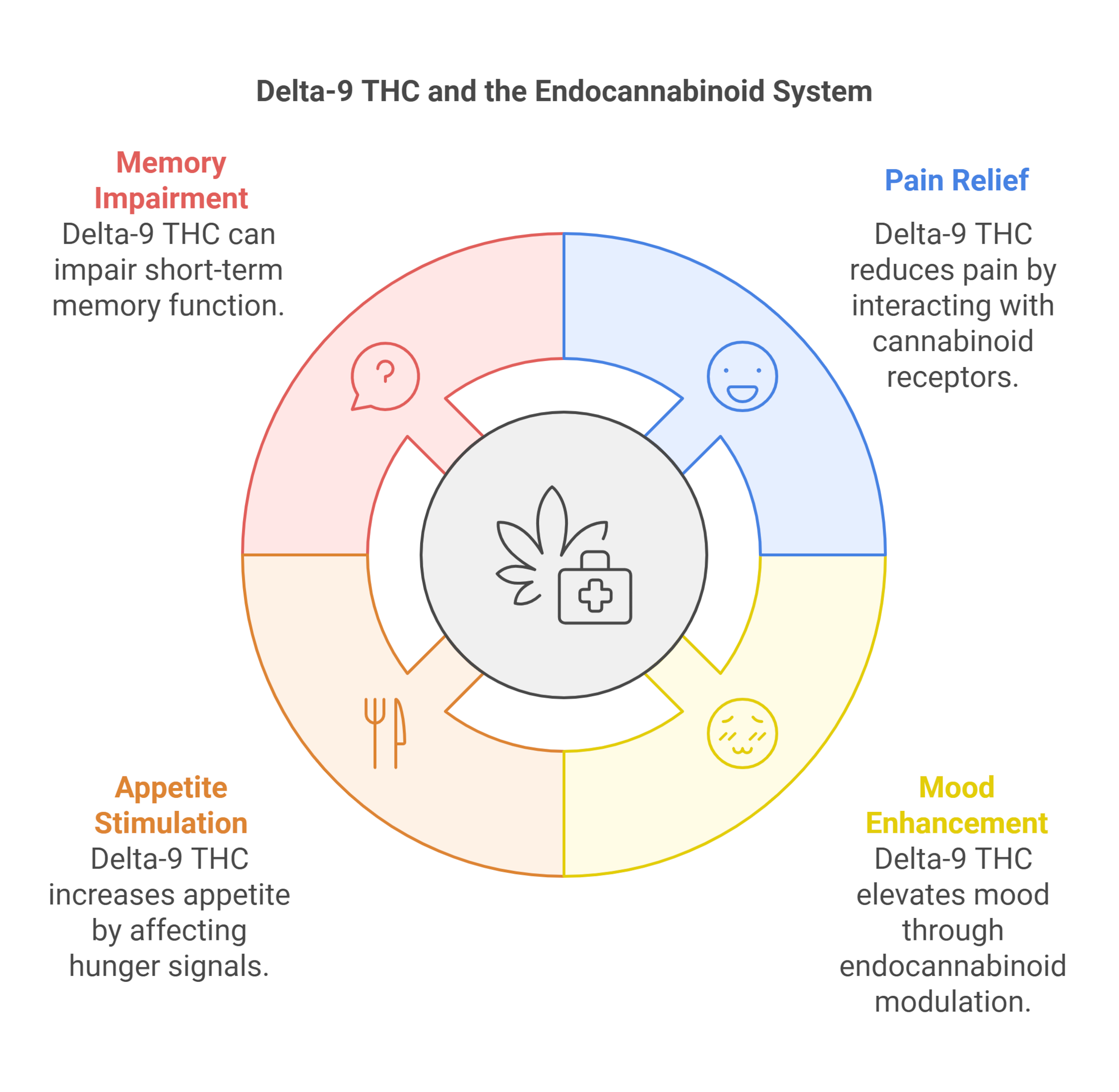
Delta-9 THC enhances endocannabinoid signaling, crucial for homeostasis. The endocannabinoid system (ECS) is a regulatory network responsible for maintaining balance in your body. It influences processes like appetite, mood, metabolism, and body temperature. Delta-9 THC binds to cannabinoid receptors (CB1 and CB2), which are found in the brain, peripheral tissues, and other parts of the body. By doing so, it boosts endogenous cannabinoid signaling, ensuring these processes function optimally.
How Does THC Support Metabolic Health?
Delta-9 THC aids in maintaining energy balance and glucose regulation.
- Energy Balance Regulation: By affecting the ECS, THC modulates fat storage and calorie utilization.
- Improved Glucose Homeostasis: Studies show that THC-treated male mice and THC-exposed mice experience better glucose regulation compared to controls.
- Endocrine Pancreas Functionality: THC also influences the genes differentially expressed in the pancreas, which supports insulin production.
While these effects show promise for metabolic health, the relationship between THC and food intake is equally noteworthy.
Can THC Affect Appetite and Food Intake?
Yes, it stimulates appetite and regulates calorie consumption.
- Increased Food Intake: THC impacts the hypothalamus, which governs hunger, leading to enhanced appetite.
- Adaptation to Dietary Changes: Research indicates that diet-induced obesity can be managed through low-dose THC. This is particularly useful in individuals with poor eating habits or metabolic disorders.
What Role Does Delta-9 THC Play in Glucose Regulation?
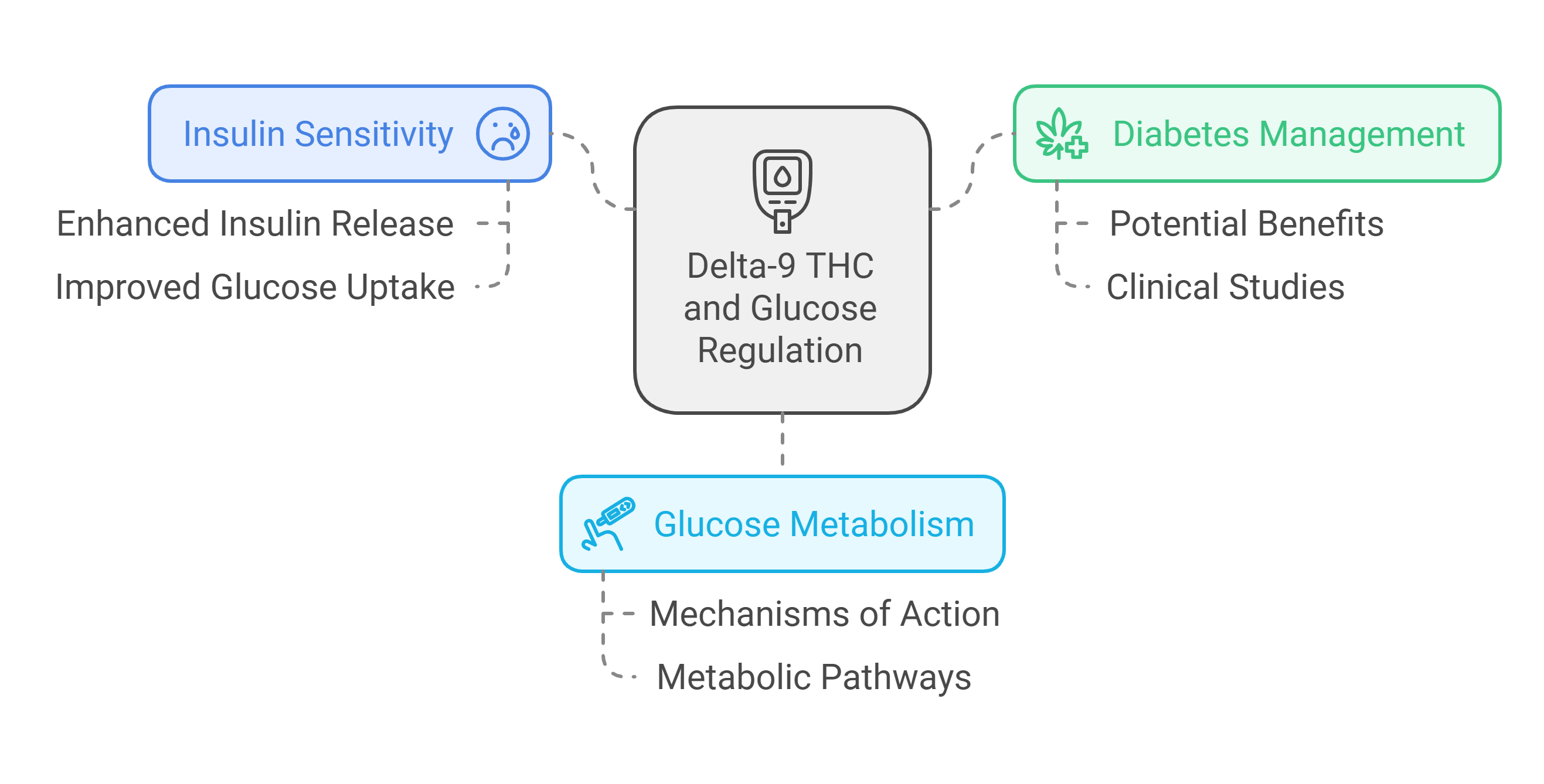
Delta-9 THC stabilizes blood glucose levels, preventing imbalances. Maintaining stable glucose levels is a cornerstone of metabolic health. By influencing the endocrine pancreas and improving insulin sensitivity, THC helps manage glucose metabolism. In studies, THC-treated mice showed better results in glucose tolerance tests and glucose challenges compared to untreated groups.
How Does THC Affect Chronic Cannabis Users?
Chronic cannabis users often experience better metabolic outcomes.
- Significant Decreases in Insulin Resistance: Long-term THC administration has been associated with improved insulin responses in adult cannabis users.
- Glucose Intolerance Prevention: Regular THC use helps balance glucose uptake in peripheral tissues, reducing risks associated with diabetes.
With glucose regulation under control, THC's impact extends to broader metabolic systems, including weight management.
Can THC Influence Glucose Homeostasis in High-Fat Diets?
Yes, THC counteracts the effects of high-fat diets.
- Improved Metabolic Outcomes: THC-treated male mice and male and female mice exposed to THC while on high-fat diets showed better glucose metabolism.
- Weight Regulation: By enhancing endogenous cannabinoid signaling, THC supports weight maintenance despite increased calorie intake.
Is THC Effective in Regulating Body Weight and Energy Balance?
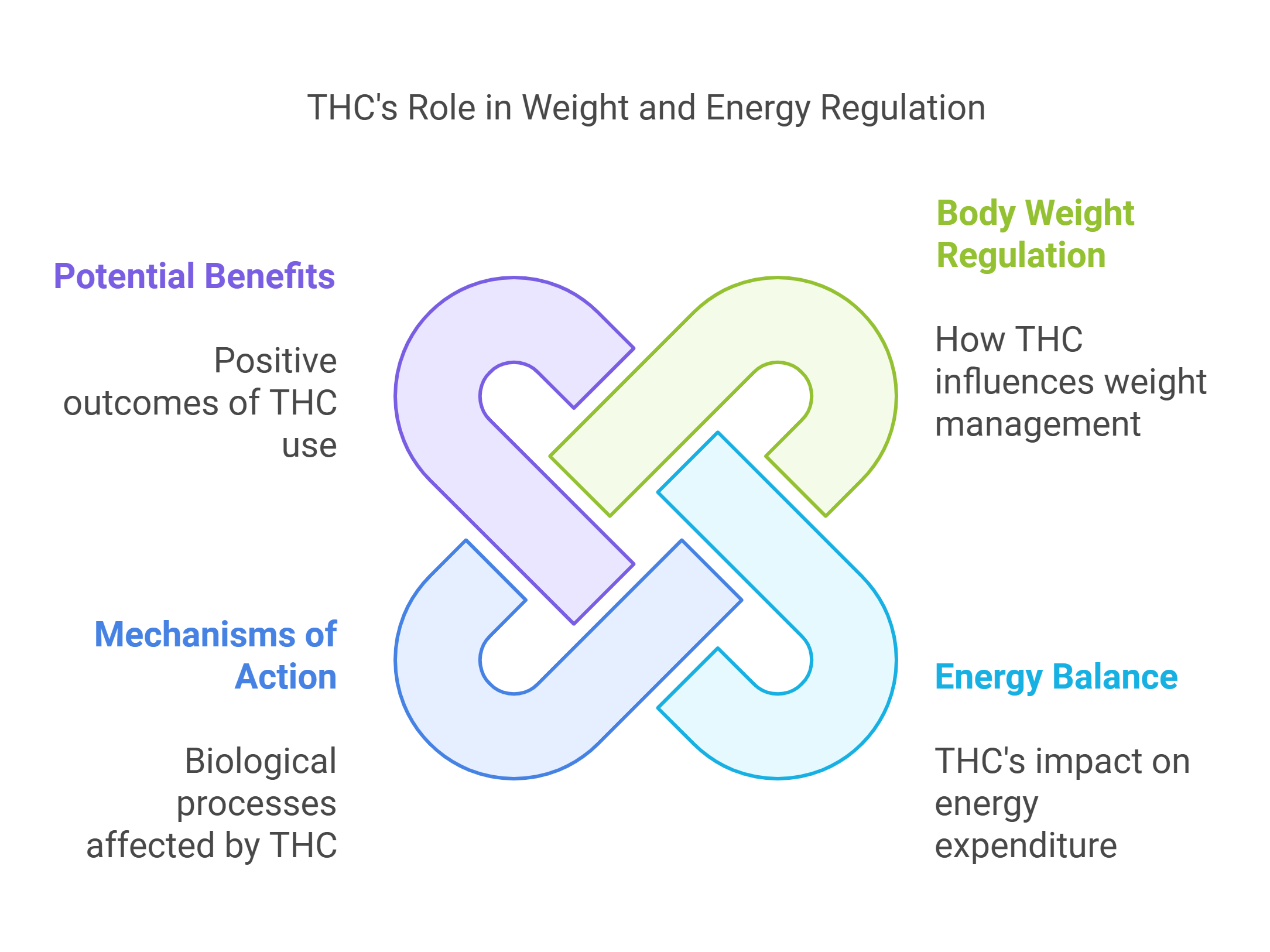
Delta-9 THC helps maintain a healthy weight by managing energy intake and expenditure. Your body's weight and energy balance are influenced by its ability to store and utilize calories. Delta-9 THC interacts with peripheral tissues like fat and muscle to modulate these processes. Studies on THC-treated mice and THC-exposed male mice reveal a significant impact on average body weight, even in chronic daily cannabis smokers.
How Does THC Prevent Weight Gain?
It stabilizes body weight through its effects on metabolism.
- Energy Storage Modulation: THC helps convert excess calories into usable energy instead of fat.
- Behavioral and Biochemical Correlates: Research on adolescent male rats and adolescent male mice indicates that THC exposure can lead to improved metabolic profiles.
Beyond weight management, Delta-9 THC plays a significant role in maintaining brain health and development.
Does THC Influence Body Temperature and Fatty Acid Metabolism?
Yes, THC regulates body temperature and fatty acid metabolism.
- Thermoregulation: By influencing the hypothalamus, THC ensures optimal body temperature for metabolic processes.
- Fatty Acid Amide Hydrolase Impact: This enzyme, modulated by THC, plays a role in breaking down fats, further supporting energy balance.
How Does THC Affect Brain Development and Adolescent Exposure?
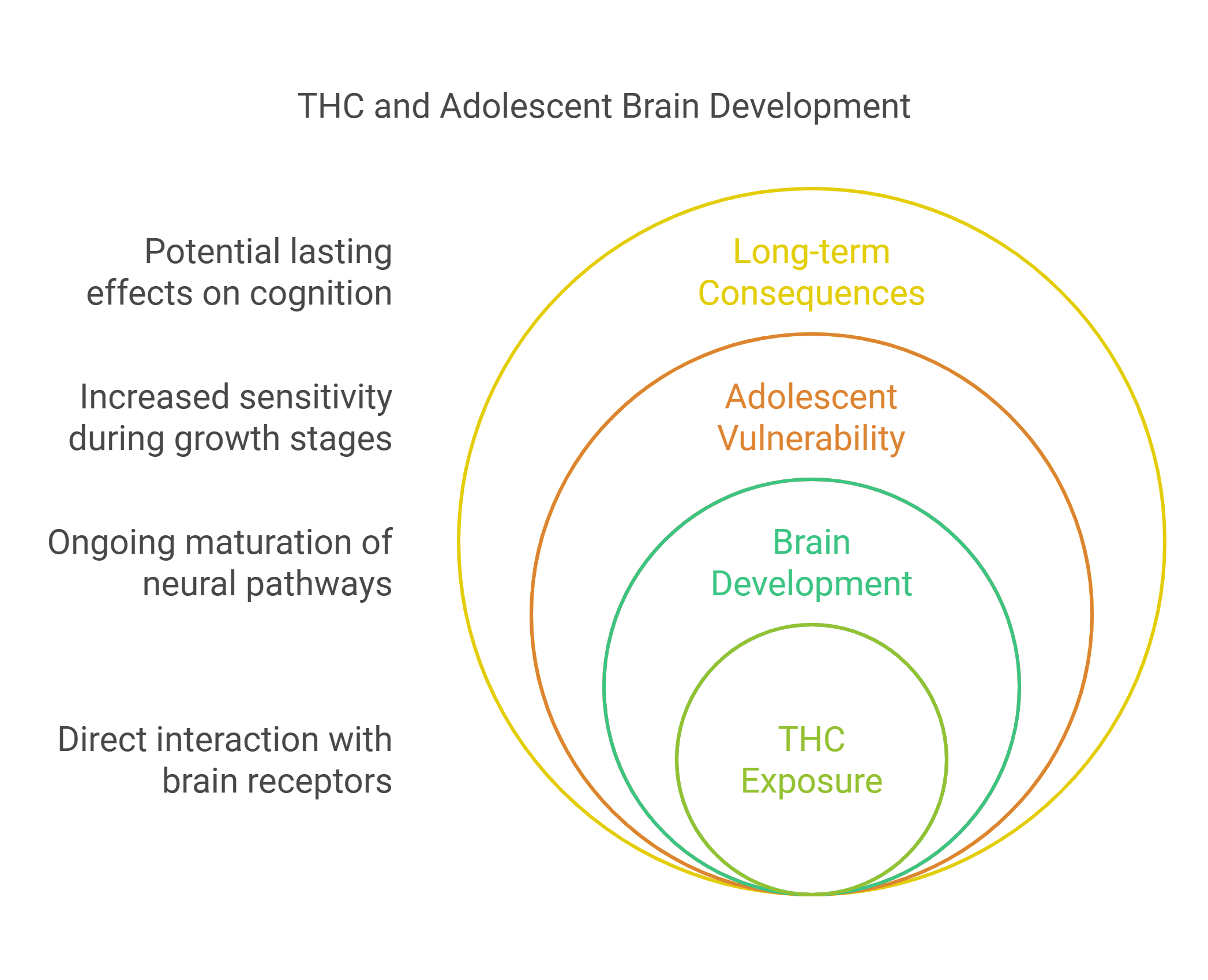
Adolescence is a sensitive period, and THC’s effects are complex. Adolescent THC exposure has been shown to provoke sex-dependent metabolic responses. For instance, in adolescent male mice, THC use influences brain regions like the prefrontal cortex, which governs decision-making and impulse control. While there are concerns about drug abuse, low-dose exposure during this stage can positively influence metabolic responses in adulthood.
What Are the Long-Term Effects of THC Use on Brain Development?
THC has both protective and disruptive effects depending on the context.
- Improved Brain Plasticity: In adult male mice, moderate THC use supports adaptive responses in the brain.
- Challenges in Young Adulthood: Prolonged THC exposure during postnatal life can impact behavioral development and glucose homeostasis.
Despite the complexities of adolescent exposure, THC's benefits for adults highlight its role in achieving metabolic balance.
Does THC Benefit Adults With Metabolic Disorders?
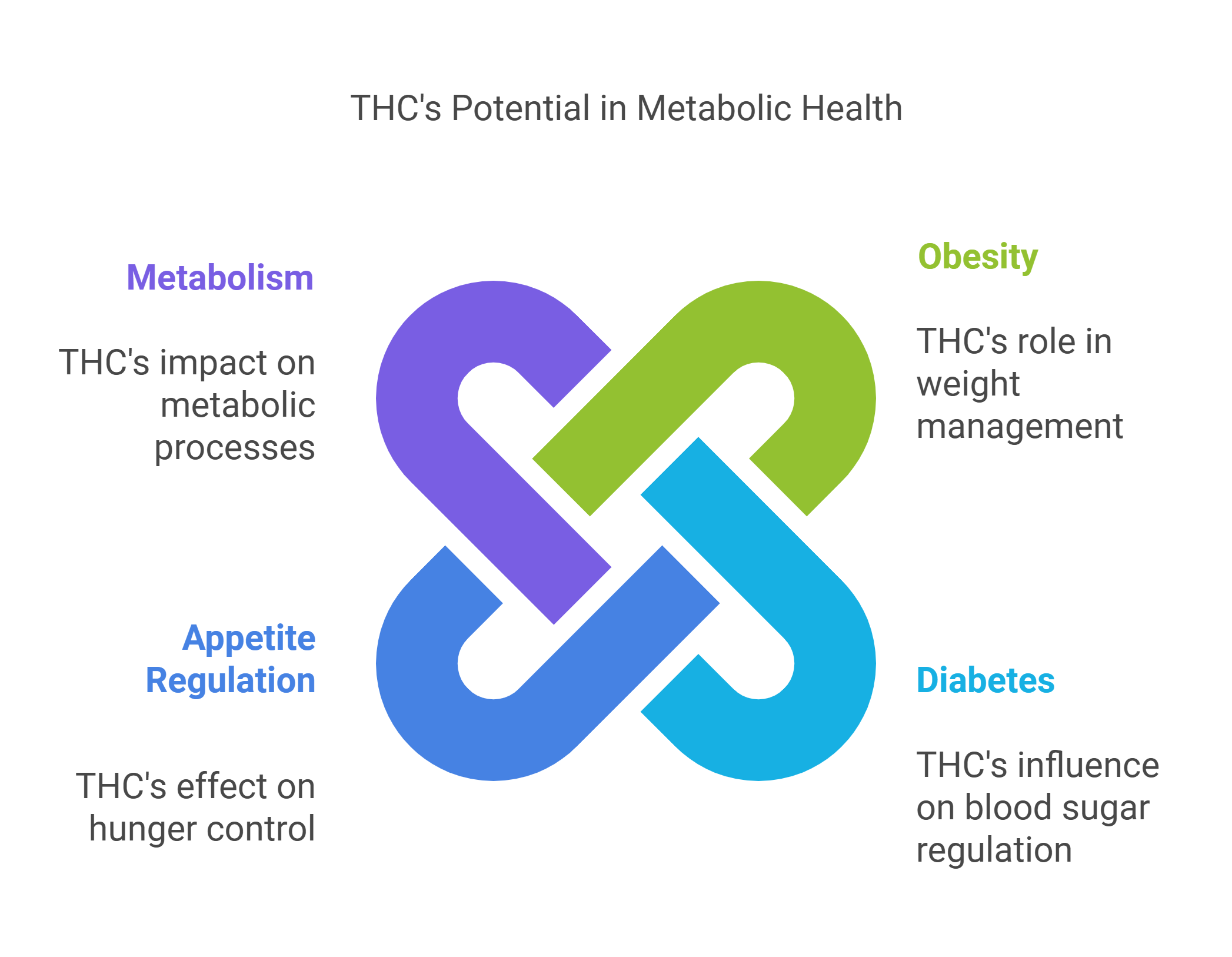
Yes, THC shows promise for adults with glucose intolerance and obesity. THC injections in adult cannabis users have demonstrated improved responses to glucose challenges. By targeting the endocrine pancreas and plasma leptin levels, THC helps restore balance in glucose metabolism. This is especially evident in studies involving THC-treated mice relative to controls, where significant improvements were observed in insulin resistance and weight management.
Can THC Mitigate Diet-Induced Obesity?
It is highly effective in controlling diet-related metabolic imbalances.
- Metabolic Responses to High-Calorie Diets: Research on THC-treated male mice highlights better weight management and reduced fat accumulation.
- Enhanced Endogenous Cannabinoid Signaling: THC's ability to enhance this signaling contributes to better energy storage and utilization.
As we continue to understand THC's benefits, it's clear its role in metabolic health extends across diverse populations.
What Are the Effects on Chronic Cannabis Users?
Chronic users often show improved metabolic profiles compared to non-users.
- Stabilized Energy Balance: Long-term use regulates body temperature and glucose metabolism.
- Genes Differentially Expressed: THC use alters gene expression in ways that promote healthier metabolic outcomes.
THC for Homeostasis
Delta-9 THC is a powerful modulator of homeostasis, influencing processes like glucose tolerance, energy balance, and endocannabinoid signaling. Research on THC-exposed mice and adult cannabis users highlights its ability to improve blood glucose levels, reduce insulin resistance, and support metabolic outcomes, even under challenging conditions like a high-fat diet.
While low-dose THC produces beneficial effects such as weight regulation and improved plasma leptin levels, higher doses or prolonged adolescent cannabinoid exposure can have mixed impacts, particularly during sensitive developmental stages like postnatal life and young adulthood.
With ongoing studies into its role in metabolic responses and diet-induced obesity, Delta-9 THC shows great promise in promoting metabolic health and maintaining a balanced energy state across life stages.


